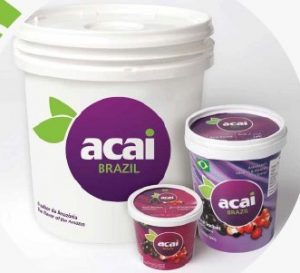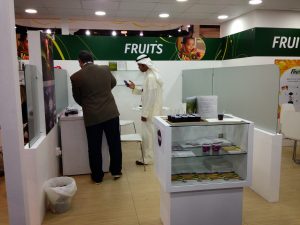São Paulo – An unlikely encounter between a Brazilian and a Kuwaiti in Madrid turned out to be a business success case. Marcelo Gurgel Prado and Sabah Al-Sabah (pictured above) met while doing their MBA studies in 2009 in Spain, and three years later founded the trading company Brazfoods, which exports açaí to Kuwait, Saudi Arabia and the UAE.
During a vacation, Sabah went to Rio de Janeiro for the New Year’s Eve and fell in love with the Brazilian culture. Prado tells that the idea came about after this visit. His Arab friend told him that Kuwait had to learn more about Brazil and wanted to bring a Brazilian product to his country.

Prado and Sabah became partners and founded Braz Foods in 2012. Since then, the trading company frozen açaí for consumption in three versions: açaí with guarana, açaí with strawberry, and açaí with banana, in three different sizes, 250 grams, 500 grams, and 3.6 kilograms. Its private label is called “Açaí Brazil.”
Besides the Amazon’s fruit, the company exports sorbets made from other Brazilian North fruits such as taperebá, graviola, mango, and Brazilian nuts, but in a much lower volume. “The other fruits don’t sell that much because of the high competition against countries such as Thailand and India that sell the same products at much lower prices, as they are closer to the Middle East,” Prado explained to ANBA in a phone interview from Madrid, where he lives. Açaí, however, doesn’t have much competition in the Arab country, said the director, since it is a typically Brazilian product.
According to Prado, a 20-ton container of the product is exported to Kuwait every three months to serve supermarkets and juice shops around Kuwait City. Part of it is transported by refrigerated trucks to Riyadh, Saudi Arabia, and other part goes to Dubai, United Arab Emirates.

“We are talking with other trading companies and want to expand business to Qatar and Oman, and we’d also like to prospect North Africa, especially Egypt,” told Prado. According to the director, Qatar is a major challenge because of Saudi Arabian economic embargo on that country, which is in force since mid-2017. “We’d have to send products by plane, which would make the final product much pricier, but we are analyzing it and intend to close a deal with them before the 2022 World Cup,” he reported.
The raw material comes from Belém while the final product is manufactured in Rio de Janeiro and shipped through the Rio Port. The ship takes around 60 days to get to Kuwait, and all the products are halal-certified, which means they are fit for Muslim consumption.
“I visit Kuwait every fourth months or so and I love that region, their culture,” said Prado. “Since they are Muslims and don’t consume alcohol, the social gatherings are usually in coffee or juice shops, and because of the hot weather, açaí is a great option and is becoming very popular,” he said.
Sabah has already brought the brand to Gulfood, the main food industry show in the Middle East, that occurs every year in Dubai.
In addition to Brazfoods, Prado also works at a Spanish trading company that exports products like olive oil, olives, jamón (Spanish cured ham), and wine to Brazil, and sells Spanish olive oil and olives to Kuwait. In addition to the trading company, Sabah owns a construction company in Kuwait.
Contact Info
Braz Foods
Marcelo Gurgel Prado
(+34) 600 633 195
marcelo.gurgel@brazfoods.com
brazfoods.com
Translated by Guilherme Miranda




